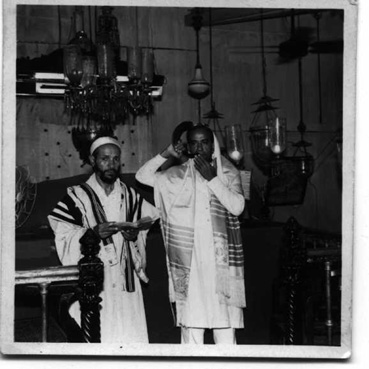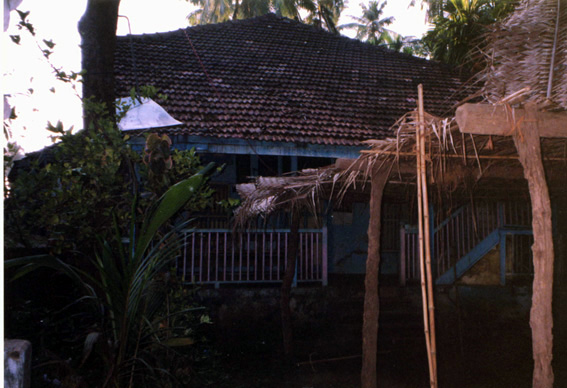|
|
BENE ISRAEL The largest Jewish community of Indian Jews is that of the Bene Israel. Earlier the Bene Israel lived in the villages of west Maharashtra in the Konkan coast. In the nineteenth century they started moving to the cities, mainly to Bombay (now called Mumbai) and to other cities among them Pune, Ahmadabad and Karachi which is now part of Pakistan. From 1950 onwards they started immigrating to Israel. The Bene Israel community was completely isolated from most of the other Jewish communities of the world. They are known as Bene Israel because that’s how they called themselves. The Bene Israel believe that their forefathers arrived in India before the destruction of the second temple. The accepted version is that their forefathers were sailing in a commercial ship from the Land of Israel to India. The ship wrecked near the coast of Konkan. From the ship survived 14 people, seven men and seven women. They swam towards the land and arrived at the village called Navgaon. All their belongings drowned in the sea. The dead bodies of the others from the ship were buried in the village. The survivors somehow managed to settle in the village and started working in agriculture and oil producing which later on became their main profession. As time passed the descendants of the survivors forgot Hebrew and their religious tradition. But they carried out some of the Israeli tradition. The Bene Israels observed Sabbath (Saturday) and abstained on this day from any work. They circumcised their sons on the eighth day after birth. They didn’t eat fish which didn’t had fins and scales. They observed a few Israeli festivals and called them by Indian names, but until their association with other Jewish communities they weren’t aware of the Hanukkah festival and the ninth of Ab fast. These two traditions became part of Jewish tradition after the destruction of the second Temple and therefore the belief that the Bene Israels forefathers arrived in India before the destruction of the second temple. On each religious occasion such as marriage; circumcision or death the Bene Israelis used to recite the ‘Shema’ verse. The Bene Israel community grew and they became a guild or an Indian caste with the profession of oil pressers. They left their first village, Navgaon, and dispersed to other villages and towns in the coast of Konkan becoming the oil producers and oil pressers of their respective villages. From the names of the villages and towns; like Roha, Pen, Pali or Ashtam; they derived their surnames like Rohekar; Penkar; Palkar; Ashtamkar and such others. The Bene Israels used to abstain from any work on Saturday (which wasn’t an acceptable feature in India) and were therefore called ‘Shenwar Teli’ meaning ‘Saturday oil pressers’. According to Bene Israel tradition, somewhere between 1000 AD to 1400 AD a Jewish merchant, David Rahabi, arrived in west India. The Bene Israels believe that Rahabi was Moses Maimonides (a very respected Jewish scholar also called ‘Rambam’) brother. Rahabi was surprised to find this Bene Israel community which followed some Jewish traditions and festivals. He decided to enlighten them with all the Jewish traditions. He chose three men from the Bene Israel community and taught them Talmud and other Jewish books. These three people became to be known as ‘Kaji’ (meaning judge in Arabic) and were religious and social leaders of the Bene Israel community. And so, it is believed, began the revivification of the Bene Israel Jews towards Judaism. Later on in the eighteenth century Cochini Jews and other Jewish communities also began to associate religiously with the Bene Israel Jews. A very important non-Jewish community that had an impact on the Bene Israel was the Christian missionaries. In the eighteenth century many Christian missionaries came to India. Some of them had anthropological interest in India. They began with their own theories about the origins of Bene Israel and other researchers including the Bene Israel themselves also began theorizing the origins of the Bene Israel. Different researchers came to different conclusions. Among the theories there were a few which came to conclusion that the Bene Israel’s forefathers arrived in India before the destruction of the second Temple and this is because the Bene Israel (meaning children of Israel) did not call themselves Jews (In the narrow sense the Jews are descendants only from the two of the twelve tribes of Children Of Israel, Yehuda and Benjamin) . For the same reason others concluded that the Indian Bene Israel are from the ‘Lost Tribes’ which are the ten tribes (of the twelve tribes of the Children Of Israel) whom the Assyrians exiled from the Land Of Israel in 800 BC and what happened of them is not known (and are therefore called Lost Tribes) . Others concluded that the Bene Israel originate from the tribes of Zvulun and Asher and that’s because the Bene Israel engaged in the profession of oil pressing which is believed to be the profession popular among the tribes of Zvulun and Asher. Other reasons that support the theory that the Bene Israel Jews are in India for over 2000 years is the fact that they weren’t aware of the main Jewish tradition which evolved in Judaism between 200 BC to 300 AD. Others concluded that the Bene Israel are Jews who came to India from Arab countries at a much later period, somewhere around the seventh century AD. And there are other theories, among them is that the Bene Israel aren’t at all of Israeli origin. With the revival of Judaism among the Bene Israel by David Rahabi, he selected three men to be the religious leaders of the community and called them ‘Kaji’. These Kajis fulfilled all the religious jobs of the community. The Kaji’s profession was hereditary. From the eighteenth century the Bene Israel developed contact and communication with other Jewish communities especially with the ‘Cochini’ Jews who lived in the southern part of India the present state of Kerala and with Jews from Iraq and Yemen. The contacts and communication with the Yemen Jews started when Bene Israels, who were soldiers in the Indian-British army, were posted at Aden in Yemen. The Bene Israel in Aden had their prayer hall in Aden and later on brought Yemenite Jewish cantors to India and so adopting the Yemenite style of praying (Because of the Yemenite way of praying some researchers wrongly presume that the Bene Israel originate from Yemen). In the first synagogues of the Bene Israel Jews the cantors were mainly Yemenite or Iraqi or Cochini. After the cantors, the Bene Israel began to bring to India Jewish circumciser and butchers from Yemen and so the Kajis lost their traditional position as head of the community.
Yemenite cantor listens while a Bene Israel blows the shofar The Bene Israels have a few Jewish customs almost unique only to them. The community members almost in every thanksgiving ceremony maintain a ritual called ‘Malida’. Malida is a home ritual in which the men sit around a plate full of roasted rice, fruits, spices and flowers. In this ceremony they sing songs praising the Lord. In the main song they also praise Prophet Elijah as the precursor of the Messiah. The Bene Israel legend also narrates of two occasions when Prophet Elijah visited them and returned to heaven. The first occasion occurred immediately after the arrival of Bene Israel to the coast of Konkan. On this occasion he revivified the unconscious Bene Israels who swam to the beach from the sea. The second occasion occurred at a much latter period. At this visit the Bene Israel believe, Prophet Elijah also left a footprint from where he rose to heaven. In this place in the village of Khandala near Alibag (there is also a tourist town by the same name near Pune in Maharashtra and that’s a different place) the Bene Israels used to have religious rituals. Another custom unique to the Bene Israel was abstaining from eating beef. The majority of Indians are Hindus. The Hindus believe that cow is sacred and therefore to maintain good relations with their Hindu neighbors they abstained from eating beef and instead eat mutton. Another custom of the Bene Israel inspired by their Hindu neighbors was, not remarrying of widows and not maintaining the levirate marriage (a Jewish custom which commands marriage between the widow and her dead husband’s brother if the man dies childless) . The Bene Israels were also less strict about the Kosher laws. They didn’t keep two complete sets of kitchen utensils but only two sets of cooking utensils. The Bene Israels divide their community into two groups. ‘Gora’ and ‘Kala’. Gora (meaning white) are majority in the community and their both parents are of Jewish religion. Kala (meaning black) is the smaller group whose father is of Israeli origin but mother is non-Jewish. These two groups use to pray together but the Goras didn’t accept the Kalas as complete Jews and didn’t mingle with them, nor did they marry with them. The Goras also didn’t allow the Kalas to hold the ‘Sefer’ or to blow the ‘Shofar’. The first Bene Israel synagogue built by Samuel Divekar in 1796. Divekar with other Bene Israels served as a soldier of the British in India. In one of the wars against the kingdom of Mysore in south India, he with other British Indian soldiers was captured. The King of Mysore, Tipu Sultan, was a Muslim. He used to execute the captured soldiers, but when his mother heard of the Bene Israel captives, she begged her son to spare the Bene Israel soldiers because the Bene Israel are referred to in the holy Muslim Koran as the Chosen People of the Almighty. Many claim that if the Bene Israels had called themselves Yehudi (Jew) and not Bene Israel they would have been executed because the Koran looks negatively at Jews but in more positive way at the Bene Israels. After being spared Samuel Divekar decided to thank the Lord by building a synagogue. Later on more synagogue were build by the Bene Israels in India. There was even a Reform Jewish synagogue built in 1925. Among the synagogues, the synagogue in the town of Panvel (near Mumbai) is considered special and sacred where it is believed, prayers are fulfilled. Until the twentieth century the Bene Israels referred to themselves as Bene Israels or Israels and not as Jews. In the twentieth century they slowly began to refer to themselves as Jews but normally they used to refer to themselves as Bene Israel and to the Jews from Arab countries who settled in India (Baghdadi Jews) as ‘Yehudi’. In some of the birth certificates and other legal documents of the early twentieth century their religion was specified as ‘Bene Israel’ and not Jew. Many Indians (non-Jewish) of west Maharashtra even today refer to Jews as Bene Israel or Israel and not as ‘Jew’. The Bene Israel as a community weren’t a powerful influential community in their local areas but there were among them some who advanced to high ranks in the armies of local rulers. Some of them also got land from the local rulers as a prize for their services. After the British arrived to India, many Bene Israels joined the British forces in India and fought for the British Empire in their different wars around the world. Later on the Bene Israels adopted the profession of building contractors and other new modern professions that emerged in India such as office clerks, law, modern medicine and other professions. There were some Bene Israels who reach to high positions of judges, lawyers, doctors, institute managers and administrative or other high ranking officers in government services. The Bene Israel’s population at their height was perhaps 30000 in India and that was in the 1950s. Proportionally they weren’t even 0.01% of the Indian population. Since the 1950s most of the Bene Israel have immigrated to Israel, and some to English speaking countries like Australia and England. Today in India there are less than 5000 Bene Israels, most of them live in Thana a suburb of Mumbai (Bombay). India's Bene Israel by Shirley Isenberg. A Comprehensive Inquiry and Sourcebook:-Even though this book isn't always available at Amazon.This is the book for those interested in the Bene Israel community. This book has lot of information about the Bene Israel community and also about Jewish culture and history. In this book you will also find information about Indian society. |



 Orle-Israel
Synagugue, Nandgaon
Orle-Israel
Synagugue, Nandgaon  Beth-El Synagogue,Rewdanda
Beth-El Synagogue,Rewdanda